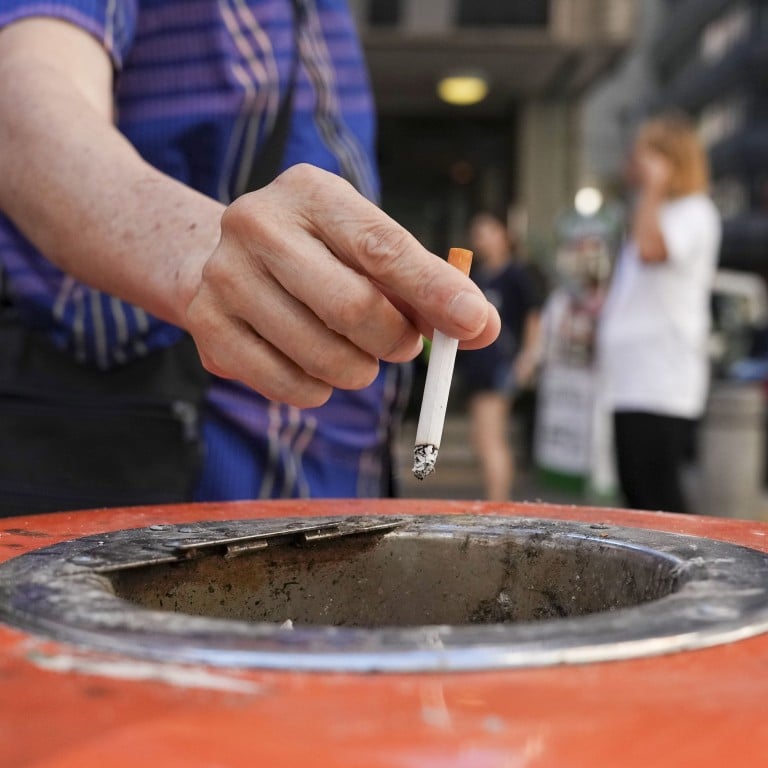
Hong Kong medical school calls for 75 per cent tax rate on tobacco from next year and total ban by 2030
- University of Hong Kong experts say total ban on tobacco needed to protect children from risk of second-hand smoke in their homes
- They warn 75 per cent tax rate on tobacco needed to reach city’s targets for smoking cessation
A top Hong Kong medical school has appealed for a complete ban on tobacco from 2030 and asked the government to increase the tobacco tax to 75 per cent of retail cost in next year’s budget and peg it to the rate of inflation.
Experts from the University of Hong Kong (HKU) on Wednesday said a total ban was the only way to tackle the exposure of children to second-hand smoke at home as people were forced to smoke in domestic settings because of strict tobacco control in public places.
“In our proposal, tobacco products should be banned like drugs from 2030, people could not sell it, use it, possess it, promote or produce it at all,” Dr Daniel Ho Sai-yin, an associate professor in HKU School of Public Health, said.
“By putting this deadline into law, the tobacco companies would back off from the Hong Kong market … and many tobacco control policies could be passed and implemented a lot more smoothly.”

Ho added achieving the goal in seven years would be possible because the city’s percentage of smokers was already among the lowest and the economy did not rely on the tobacco industry.
Smokers amount to 9.5 per cent of the population of Hong Kong at present, nearly 600,000 people.
Ho added that two surveys conducted by HKU between 2019 to 2021, which interviewed more than 5,000 residents each time, found 77 per cent of Hongkongers supported the university’s proposals, including almost 20 per cent of smokers.
The experts proposed the city, in addition to raising the tobacco tax to 75 per cent, should start discussions on a bill to mandate a tobacco-free city.
Health authorities earlier launched a public consultation on tobacco control, with a target to reduce the percentage of smokers to 7.8 per cent by 2025 and the ultimate goal of ending tobacco use altogether.
The HKU experts proposed to bring the percentage down to 5 per cent by 2027 and to below 3 per cent two years after that.
Ho highlighted that a total ban had to be imposed to protect children from second-hand smoke at home, a loophole no previous policy had tackled.
Cut-price Hong Kong cigarettes spark call for duty loophole to be closed
HKU conducted a survey on smoking among primary and secondary school pupils every two years between 2010 and 2020, with between 27,000 and 60,000 views canvassed each time.
The survey found nearly 60 per cent of schoolchildren were exposed to second-hand smoke at home in 2020, either from family or neighbours, a huge increase on the 33 per cent recorded a decade earlier.
The researchers also linked exposure to second-hand smoke with lower educational achievement and family income, a phenomenon Ho said was “health inequity”.
HKU School of Nursing professor Kelvin Wang Man-ping warned that bringing down the percentage of smokers to 7.8 per cent could not be done without the 75 per cent tobacco tax from next year, a level he said was backed by many smokers.
Tax at present accounts for 64 per cent of the retail price of tobacco products.
The rate was increased in February’s budget, but is still well below the 75 per cent benchmark set by the World Health Organization.
In multiple HKU surveys that polled 18,000 people between 2015 to 2022, 78 per cent of the total number of respondents supported increased tobacco tax and 29 per cent were smokers.
“Almost one-third of smokers supported increasing tobacco tax … many of them are rational and wanted the government to increase the tax, which could help them quit the habit,” Wang explained.
“This is understandable because smoking is not a free choice. The smokers are indeed controlled by nicotine.”
Will Hong Kong’s ideas to stub out cigarettes win public approval?
Among about 3,000 respondents who smoked, more than half said they would quit or cut down smoking by half because of cigarette price increases, with younger people the most willing.
About 60 per cent of respondents also supported pegging the tobacco tax increase to the inflation rate.
Professor Sophia Chan Siu-chee of the university’s nursing school asked the government to put more resources into smoking cessation services in clinical and community settings.
“Medical encounters were a teachable moment to motivate smokers to quit smoking, for example, when sick children were admitted, when couples come for prenatal check-ups, or when the smokers were diagnosed with diseases,” Chan, a former health minister, explained.
“It would be great if all healthcare workers could help identify smokers in their daily routines, give advice, and refer them to cessation services.”
But the Long-term Tobacco Policy Concern Group, a smokers’ lobby organisation, insisted it was impractical to cut smoking rates by so much in just seven years.
The group added that no country had yet succeeded in banning tobacco products altogether.
“Hong Kong’s smoking rate is among the lowest in the world and many of the remaining ones are diehard smokers who could hardly be motivated to quit by coercion,” Joe Lo Kai-lut, the group’s convenor, maintained.
“We recognise the problem of second-hand smoke at home, but this should not be used as an excuse to invade private space and deprive individuals of choice.”

